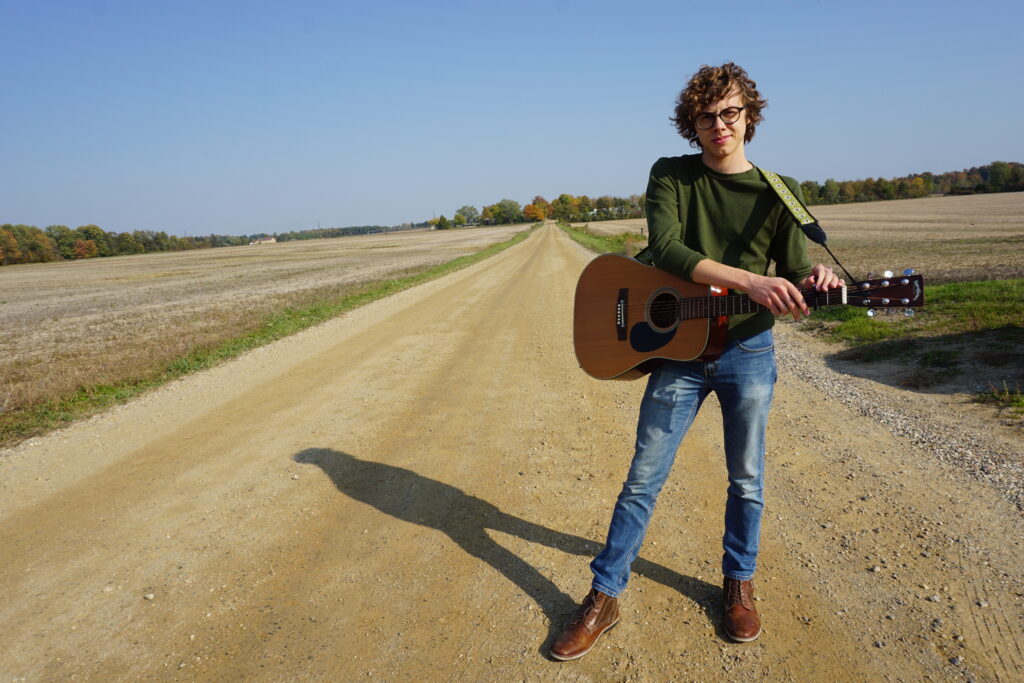Jonathan Townley
The one man band answers tough questions.
Inspired by his late grandfather’s passing, Jonathan honored his memory in his album It was a privilege to know you when you were shorter. I had the pleasure of listening to sneak peaks catching up over the phone. During the plague, many were wishing their summers were different while Jonathan was eating, breathing and dreaming about this album.
I call Jonathan over FaceTime. He is wearing a red plaid button up, a pair of glasses, and over the ear headphones. He sits in his parent’s basement and I sit in my childhood bedroom. Our friendship, which began at college parties and theatre classes, transformed into a deep and loving friendship refocusing on our creativity through the quarantine. I ask him some tough questions, which he answers with even tougher questions.
I remember you telling me about listening to public radio growing up: did you imagine your music on the radio?
I did not. It was a dream of mine. I grew up listening to, on the weekends, celtic music and American folk music from Kalamazoo. Roots music from multiple different shows, and I’d listen to that style of music, mostly acoustic. When I first started making music, I didn’t intend originally to put it anywhere. It was just for my family and myself. Now listening to my music on the radio has been a crazy experience, a full circle for me.

I was thinking about Bob Dylan and his music protesting against the Vietnam war and fighting for civil rights. What is your relationship with folk music with that time period and your political stance now?
I have a little bit of a complicated relationship with that for two reasons. One being the music of the 1960’s there were a lot of songs that became legitimate protest songs and fueled movements. But there were a lot of artists coming in and pretending to be activists, creating songs to capitalize on the moment. This is a really controversial opinion.
But I think Bob Dylan is a really excellent example of this. His very early songs like the “Big ballad of Edgar Maver”, oh that’s like a protest song, clearly he’s protesting against the brutality and the state glossing over the violence against Black people. But then you get to his later stuff and he continues to use his power he’s gained from being this activist musician during a time where activism is central and powerful to become this figure that is hugely powerful and makes a ton of money. It all comes back to capitalizing this white college educated middle class who are buying these records and these activist songs that don’t have a hard hitting message.
Like I think Peter Paul and Mary is a really good example of this. They have a song called, “If I had a hammer” and it goes like “If I had a hammer, I’d hammer out justice / If I had a bell, I’d ring out justice / If I had a song to sing, I’d sing about everyone getting along.” It’s framed as this activism song of wanting justice, but there’s nothing that is subversive about that. There is nothing that challenges norms in that song. It’s very easy listening. So I think the folk 60’s music where it fell short is by creating music that is too easy to handle so it appealed to the white educated folks and fell short to be songs for movements.
But then you have songs by Bob Dylan that really do analyze real social injustice, those perhaps happen earlier in his career. The people who more capitalized off the movement are Peter Paul and Mary and the Kingston Trio. Then there were other bands who created folk music that wasn’t necessarily activism music but still used the boost of folk as activism and did covers of activist songs, even though they weren’t necessarily activist bands.
Another example [of artists capitalizing off the movement] is Peter Paul and Mary, they did a cover of “Blowing in the Wind.” The main question of the song: how long does it take for justice to come and the answer is we’re not sure but [justice] is coming. Bob Dylan’s version of it is hard to listen to because the way his voice is and the way he plays guitar is harsh. But Peter Paul and Mary made a cover and it almost sounds waltzy. It’s much easier to listen to. It’s a packaged up version of it.
I don’t know if that answers your question.
My understanding of Bob Dylan is shallow, I just knew him as a famous folk singer. You have a nuanced perspective of him and folk music. I was going to ask you what you think the role of the artist is within a social movement, but you complicated that question for me.
That’s something I’m still trying to figure out to answer you honestly. I did this big research paper my freshman year and I read all these books and articles about folk music. Since I had been a fan of folk music all my life, I was like how about I look at this critically. That’s why I did all this research. After all this, I began asking myself what is the role of a white folk singer in activism? What does that look like? How can that be something that is legitimate, meaningful and impactful? As opposed to something that is commercial.
At that time, I wasn’t interested in putting out music so I didn’t think it affected me directly. More recently it has. My album came out recently, and I saw other artists say, “Oh if you buy my album, I’m going to be donating a portion of my proceeds to Black Lives Matter organizations and nonprofits.” This is something I was considering and trying to wrestle with. If I do that, am I promoting these groups or am I using these groups to draw attention to myself? Maybe myself as a person separately donating to that group from the money that I earn is more powerful than me saying that I’m going to donate to that group publicly.
I’m still wrestling with these questions. Perhaps my role as a white man is amplifier and follower as opposed to teacher.
Those are some hard questions! There’s a component of donation and how do we move money towards Black and BLM orgs. To me, what your album does really well, since you asked me, is share a story honestly, earnestly and in its most authentic form. Your use of language and storytelling is powerful and allows you to share your story, but also, allows other people to share their stories.
I think one of the main themes of the album is grief, and everyone is grieving right now. From the loss of the ordinary. From the loss of a loved one. And also, because of the brutality of the police this summer. That happened to so many of my friends and their friends and our community is all so broken from that. I wanted a way to honestly express my grief, because so many of the traditional ways to express our grief like funerals aren’t possible now. In creating a way to express my grief and to allow others to address their grief and hopefully my album allows for some of that. If you don’t address grief, it turns into anger and negative emotions at yourself.
I think that’s incredibly powerful. So much of the world is dealing with harm and pain that isn’t expressed.
Right, how do we deal with trauma related to injustice? How do we deal with trauma related to massive grief, how do we move forward from that. It seems like we’re not, we’re ignoring it. We’re trying to make life as close to normal as it usually is.
I don’t know if I’ve created any activist songs that create social change.
I wouldn’t ask Jonathan, do you make activism music or protest songs? I would say Jonathan Townley’s music heals people and allows space for grief and healing, and healing is part of movement work. Your family’s tradition of ministry and community work has allowed you to know how to do that. I think that’s important that there are many people in the movement who won’t have space and time to do that work.
I hadn’t thought about that. Healing and taking care of one another. I guess that’s what I try to do with my music, and any activism movement is about taking care of people.
You can check out more at Jonathan Townley at Bandcamp.

____________________________________________________________________________
MICS AND MEGAPHONES is a series of interviews with politically conscious and underground artists, musicians, and music lovers about healing, love, revolutionary thought and freedom. Each interview is a conversation between Paige Chung and guests.
Paige Chung is a poet and skater. Her last project, Nail Trap, is juicier than your neighborhood gossip and her current project is hotter than your cousin’s mixtape. Based in Los Angeles, but she rolls everywhere. See what’s next for her at miublue.com.
During the COVID-19 pandemic, all the interviews are held virtually over the phone, FaceTime, Zencastr, Google Hangouts, Zoom, and basically anything that isn’t Skype.

Paige Chung